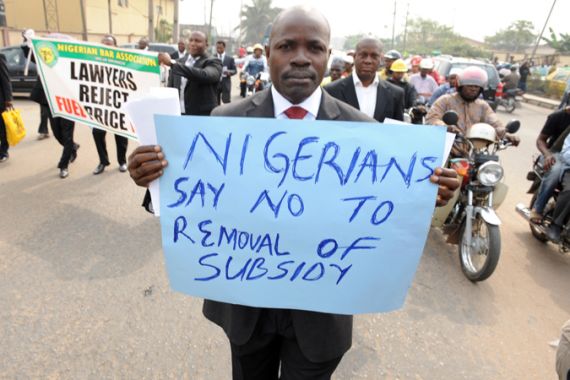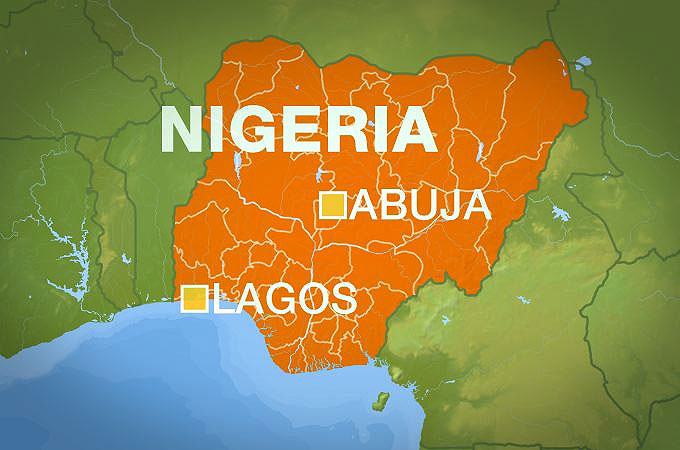Nigeria MPs oppose president over fuel prices
Unions to carry out nationwide strike from Monday despite parliament urging government to reinstate fuel subsidies.

| Ngozi Okonjo-Iweala, Nigeria’s finance minister, spoke to Al Jazeera from the capital Abuja |
Nigerian parliamentarians have turned against the president’s decision to end government fuel subsidies that kept gasoline prices low, ahead of a planned labour strike that threatens to paralyse Africa’s most populous nation.
Meeting in an emergency session on Sunday, Nigeria’s House of Representatives voted for a resolution calling on President Goodluck Jonathan to restore subsidies that cost the country about $8bn a year.
The House adopted a motion urging “government to suspend its decision on the removal of [the] fuel subsidy in appreciation of the mood of the nation and allow more room for consultations”.
The lawmakers also urged labour unions “to suspend the intended strike action and submit to further dialogue on the matter”.
Two major unions have said they will carry out a nationwide strike scheduled to begin on Monday, despite a court order restraining them from doing so.
The strike follows a string of protests against the government’s removal of the subsidy on January 1.
Anger extends beyond just the fuel subsidy to the government’s weak response to ongoing violence in Nigeria by a radical Islamist sect that killed at least 510 people last year, according to an Associated Press count.
Protesters also remain angered by decades of corruption that has seen billions of oil dollars stolen by politicians as electricity and clean drinking water remain scarce.
President criticised
 |
During Sunday’s session, televised live from the capital Abuja, even members of Jonathan’s ruling People’s Democratic Party spoke out against him.
Others said the fuel subsidy removal came without their knowledge, signaling Jonathan’s administration moved unilaterally on an issue now dividing the country.
Some lawmakers also said the fuel subsidy removal could lead to a revolution like those that swept across some Middle Eastern countries last year.
“We are sitting near a keg of gunpowder and we are playing with fire,” said Pally Isumafe Obokhuaime Iriase, an MP with the Action Congress of Nigeria.
“This will be the last straw that will break the camel’s back if we do not act.”
Fuel prices have risen from $1.70 per gallon (45 cents per litre) to at least $3.50 per gallon (94 cents per litre) since the subsidy ended at Jonathan’s order.
The move spurred a spike in prices for food and transportation across the nation of more than 160 million people where most live on less than $2 a day.
Protests have grown increasingly volatile, while police have fired tear gas and have been accused of using excessive force to disperse demonstrators. A union accused police of shooting dead a demonstrator last week, but authorities denied it and said he was killed by a mob.
Under pressure
Monday’s strike raises the risk of further clashes in Nigeria. The situation in Nigeria is “quite precarious and worrisome. There’s lots of uncertainty,” said Onah Ekhomu, a Lagos-based independent security expert.
“We have a potential sectarian crisis looming, and now to cut the subsidies; almost the entire country is boiling.”
The mounting crises have posed major risks for Jonathan’s administration, which has come under intense pressure over both the violence and the fuel subsidies.
“I think what is going on is not just a question of fuel subsidies, but a whole question of how the country is being run,” said Clement Nwankwo, head of Policy and Legal Advocacy Centre, a local NGO.
“Lots of people are not satisfied with the way the country is being run. They think there are huge levels of incapacity, incompetence, coupled with huge corruption.”
The Nigerian government says it spent more than $8bn on subsidies in 2011. Economists and some government officials see the fuel subsidy removal policy as a vital move that could allow the country to improve its woefully inadequate infrastructure and ease pressure on its foreign reserves.
But Nigerians view the subsidies as their only benefit from the nation’s oil wealth and lack any real trust in government after years of deep-rooted corruption.